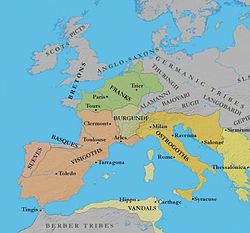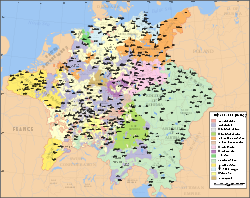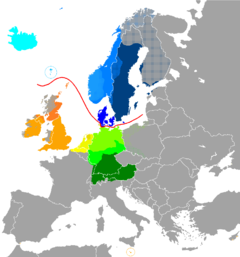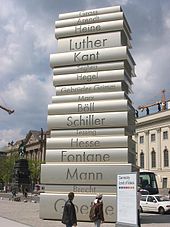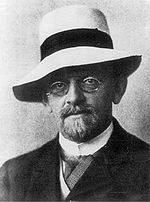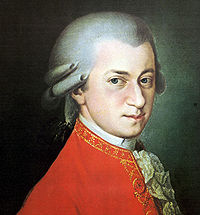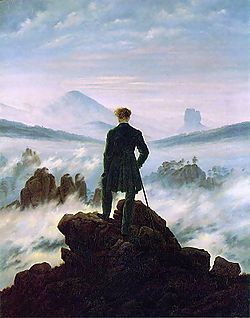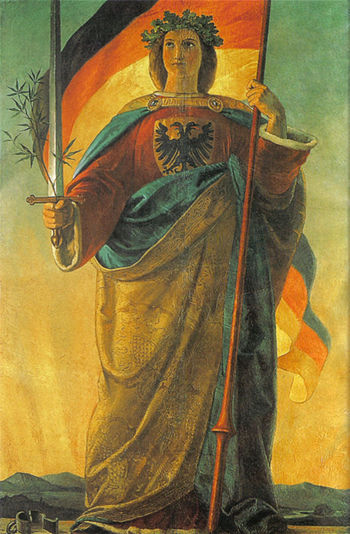- Germans
-
This article is about Germans as an ethnic group. For other uses, see Germans (disambiguation). For the population of Germany, see Demographics of Germany. For an analysis on the nationality or German citizenship, see German nationality law. For the term "Germans" as used in a context of antiquity (pre AD 500), see Germanic tribes.
Germans
Deutsche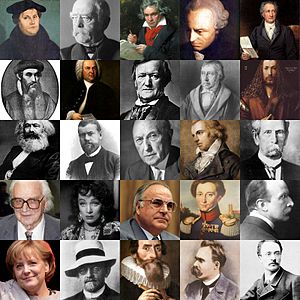
Martin Luther • Otto von Bismarck • Ludwig von Beethoven • Immanuel Kant • Johann Wolfgang von Goethe • Johann Gutenberg • Johann Sebastian Bach • Richard Wagner • Wilhelm Friedrich Hegel • Albrect Durer • Karl Marx • Max Weber • Konrad Adenauer • Friedrich Schiller • Karl Benz • Konrad Zuse • Marlene Dietrich • Helmut Kohl • Carl von Clausewitz • Max Planck • Angela Merkel • David Hilbert • Johannes Kepler • Friedrich Nietzsche • Rudolf Diesel
Total population German Diaspora ca. 150 million[1] Regions with significant populations  Germany 75 million[2][3][4]
Germany 75 million[2][3][4]see below; see also Ethnic Germans. Languages German: High German (Upper German, Central German), Low German (see German dialects)
Religion Roman Catholic, Protestant (chiefly Lutheran)
Related ethnic groups Austrians, Swedes,[5] Norwegians,[5] Danes, Dutch, Icelanders, Swiss Germans, and other Germanic peoples
The Germans (Deutsche) are a Germanic ethnic group native to Central Europe. The English term Germans has referred to the German-speaking population of the Holy Roman Empire since the Late Middle Ages.[6]
Of approximately 100 million native speakers of German in the world, about 66–75 million consider themselves Germans. There are an additional 80 million people of German ancestry mainly in the United States, Brazil, Canada, Argentina, France, Russia, Chile, Poland, Australia and Romania who most likely are not native speakers of German.[7] Thus, the total number of Germans worldwide lies between 66 and 160 million, depending on the criteria applied (native speakers, single-ancestry ethnic Germans, partial German ancestry, etc.).
Today, peoples from countries with a German-speaking majority or significant German-speaking population groups other than Germany, such as Austria, Switzerland, Liechtenstein and Luxembourg, have developed their own national identity and usually do not refer to themselves as Germans in a modern context.
Contents
Name
Further information: Names of Germany Map of the Roman Empire and Magna Germania in the early 2nd century.
Map of the Roman Empire and Magna Germania in the early 2nd century.
The German term Deutsche originates from the Old High German word diutisc (from diot "people"), referring to the Germanic "language of the people". It not clear that how commonly, if at all, the word was used as an ethnonym in Old High German.
Used as a noun, ein diutscher in the sense of "a German" emerges in Middle High German, attested from the second half of the 12th century.[8]
The Old French term alemans is taken from the name of the Alamanni. It was loaned into Middle English as almains in the early 14th century. The word dutch is attested in English from the 14th century, denoting continental West Germanic ("Dutch" and "German") dialects and their speakers.[9]
While in most the Romance languages the Germans have been named from the Swabians or Alamanni (some, like standard Italian, retain an older borrowing of the endonym), the Old Norse, Finnish and Estonian names of the Germans was taken from that of the Saxons. In Slavic languages, the Germans were given the name of němьci (singular němьcь), originally with a meaning "foreigner, one who does not speak [Slavic]".
The English term Germans is only attested from the mid-16th century, based on the classical Latin term Germani used by Julius Caesar and later Tacitus. It gradually replaced Dutch and Almains, the latter becoming mostly obsolete by the early 18th century.[10][11]
German Ethnic Identity
Main article: Ethnic GermansThe German ethnic identity is complex, and has been described as forming a continuum of "Germanness" defined by factors such as language, appearance, family background, country of residence and country of origin.[12]
Persons who speak German as their first language, look German and whose families have lived in German for generations are considered "most German", followed by categories of diminishing Germanness such as Aussiedler (people of German ancestry whose families have lived in Eastern Europe but who have returned to Germany), Restdeutsche (people living in lands that have historically belonged to Germany but which is currently outside of Germany), Auswanderer (people whose families have emigrated from Germany and who still speak German), German speakers in German speaking nations such as Austrians, and finally people of German emigrant background who no longer speak German.[13]
History
Further information: History of GermanyThe Germans are a Germanic people, which as an ethnicity emerged during the Middle Ages.[citation needed] From the multi-ethnic Holy Roman Empire, the Peace of Westphalia (1648) left a core territory that was to become Germany.
Origins
Further information: Germanic peoples and TheodiscusThe area of modern-day Germany in the European Iron Age was divided into the (Celtic) La Tène horizon in Southern Germany and the (Germanic) Jastorf culture in Northern Germany.
The Germanic peoples during the Migrations Period came into contact with other peoples; in the case of the populations settling in the territory of modern Germany, they encountered Celts to the south, and Balts and Slavs towards the east.
The Limes Germanicus was breached in AD 260. Migrating Germanic tribes commingled with the local Gallo-Roman populations in what is now Swabia and Bavaria. The migration-period peoples who would coalesce into a "German" ethnicity were the Saxons, Franci, Thuringii, Alamanni and Bavarii. By the 800s, the territory of modern Germany had been united under the rule of Charlemagne. Much of what is now Eastern Germany became Slavonic-speaking (Sorbs and Veleti), after these areas were vacated by Germanic tribes (Vandals, Lombards, Burgundians and Suebi amongst others) which had migrated into the former areas of the Roman Empire.
Medieval history
Main articles: Ostsiedlung and History of German settlement in Eastern Europe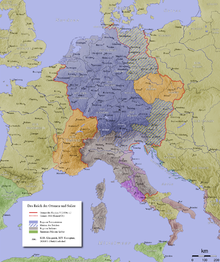 The Holy Roman Empire around AD 1000. The sphere of German influence (Regnum Teutonicorum) is marked in blue.
The Holy Roman Empire around AD 1000. The sphere of German influence (Regnum Teutonicorum) is marked in blue.
A German ethnicity emerged in the course of the Middle Ages, ultimately as a result of the formation of the kingdom of Germany within East Francia and later the Holy Roman Empire, beginning in the 9th century. The process was gradual and lacked any clear definition, and the use of exonyms designating "the Germans" develops only during the High Middle Ages. The title of rex teutonicum "King of the Germans" is first used in the late 11th century, by the chancery of Pope Gregory VII. Natively, the term ein diutscher "a German" is used of the people of Germany from the 12th century.
After Christianization, the Roman Catholic Church and local rulers led German expansion and settlement in areas inhabited by Slavs and Balts (Ostsiedlung). Massive German settlement led to their assimilation of Baltic (Old Prussians) and Slavic (Wends) populations, who were exhausted by previous warfare. At the same time, naval innovations led to a German domination of trade in the Baltic Sea and parts of Eastern Europe through the Hanseatic League. Along the trade routes, Hanseatic trade stations became centers of German culture. German town law (Stadtrecht) was promoted by the presence of large, relatively wealthy German populations and their influence on political power. Thus people who would be considered "Germans", with a common culture, language, and worldview different from that of the surrounding rural peoples, colonized trading towns as far north of present-day Germany as Bergen (in Norway), Stockholm (in Sweden), and Vyborg (now in Russia). The Hanseatic League was not exclusively German in any ethnic sense: many towns who joined the league were outside the Holy Roman Empire and a number of them may only loosely be characterized as German. The Empire was not entirely German either.
Early Modern period
 18 January 1871: The proclamation of the German Empire in the Hall of Mirrors of the Palace of Versailles. Bismarck appears in white. The Grand Duke of Baden stands beside Wilhelm, leading the cheers. Crown Prince Friedrich, later Friedrich III, stands on his father's right. Painting by Anton von Werner.
18 January 1871: The proclamation of the German Empire in the Hall of Mirrors of the Palace of Versailles. Bismarck appears in white. The Grand Duke of Baden stands beside Wilhelm, leading the cheers. Crown Prince Friedrich, later Friedrich III, stands on his father's right. Painting by Anton von Werner.
From the late 15th century, the Holy Roman Empire came to be known as the Holy Roman Empire of the German nation, even though it was not exclusively German, and notably included sizeable Slavic minorities. The Thirty Years' War, a series of conflicts fought mainly in the territory of modern Germany, weakened the coherence of the Holy Roman Empire, leading to the Kleinstaaterei in 18th-century Germany.
The Napoleonic Wars were the cause of the final dissolution of the Holy Roman Empire, and ultimately the cause for the quest for a German nation state in 19th-century German nationalism. After the Congress of Vienna, Austria and Prussia emerged as two competitors. Austria, trying to remain the dominant power in Central Europe, led the way in the terms of the Congress of Vienna. The Congress of Vienna was essentially conservative, assuring that little would change in Europe and preventing Germany from uniting.[citation needed] These terms came to a sudden halt following the Revolutions of 1848 and the Crimean War in 1856, paving the way for German unification in the 1860s.
In 1866, because Austria and Prussia could not decide on what was the right solution on how a unified Germany was to happen caused several problems inside the German Confederation between the two top German states. The main reasons behind this war was because the Austrian Empire was not willing to give up any of the German lands it owned and was hoping to unify and lead Germany as "Greater Germany" and therefore did not want to take second place to Prussia. On the other hand Prussia was wanting to unify Germany as "Little Germany" and exclude Austria from it. This consequently seen the Prussians successfully defeat the Austrians and thus Austria now was no longer part of the German Confederation and no longer took part in German politics and the "Little Germany" was prevailed.[14]
In 1870, after France attacked Prussia, Prussia and its new allies in Southern Germany (among them Bavaria) were victorious in the Franco-Prussian War. It created the German Empire in 1871 as a German nation-state, effectively excluding the multi-ethnic Austrian Habsburg monarchy and Liechtenstein. Integrating the German-speaking Austrians nevertheless remained a strong desire for many people of Germany and Austria, especially among the liberals, the social democrats and also the Catholics who were a minority in Germany.
During the 19th century in the German territories, rapid population growth due to lower death rates, combined with poverty, spurred millions of Germans to emigrate, chiefly to the United States. Today, roughly 17% of the United States' population (23% of the white population) is of mainly German ancestry.[15]
Twentieth century
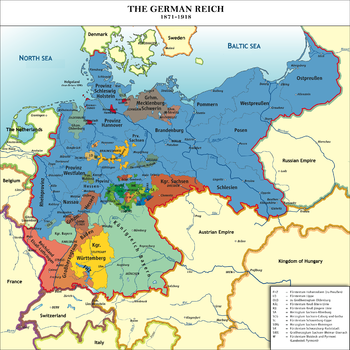 The German Empire of 1871–1918. By excluding the German-speaking part of the multinational Austrian Empire, this geographic construction represented a little Germany solution.
The German Empire of 1871–1918. By excluding the German-speaking part of the multinational Austrian Empire, this geographic construction represented a little Germany solution. Further information: Volksdeutsche and Reichsdeutsche
Further information: Volksdeutsche and ReichsdeutscheThe dissolution of the Austrian-Hungarian Empire after World War I led to a strong desire of the population of the new Republic of German Austria to be integrated into Germany or Switzerland.[16] This was, however, prevented by the Treaty of Versailles.
The Nazis, led by Adolf Hitler, attempted to unite all people they claimed Germans (Volksdeutsche) into one realm, including ethnic Germans in eastern Europe,[17] many of whom had emigrated more than one hundred fifty years before and developed separate cultures in their new lands. This idea was initially welcomed by many ethnic Germans in Czechoslovakia, Austria,[citation needed] Poland, Danzig and western Lithuania. The Swiss resisted the idea. They had viewed themselves as a distinctly separate nation since the Peace of Westphalia of 1648.
After World War II, eastern European nations, including areas annexed by the Soviet Union and Poland, expelled ethnic Germans from their territories, including Czechoslovakia, Hungary, Romania and Yugoslavia. 14 million ethnic German refugees fled to western Germany and Europe, the United States, Canada, and South America.
After WWII, Austrians increasingly saw themselves as a separate nation from the German nation. Recent polls show that no more than 6% of the German-speaking Austrians consider themselves as "Germans".[18] An Austrian identity was vastly emphasized along with the "first-victim of Nazism theory."[19] Today over 80 percent of the Austrians see themselves as an independent nation.[20]
1945 to present
Between 1950 and 1987, about 1.4 million ethnic Germans and their dependants, mostly from Poland and Romania, arrived in Germany under special provisions of right of return. With the collapse of the Iron Curtain since 1987, 3 million "Aussiedler" – ethnic Germans, mainly from Eastern Europe and the former Soviet Union – took advantage of Germany's law of return to leave the "land of their birth" for Germany.[21] Approximately 2 million, just from the territories of the former Soviet Union, have resettled in Germany since the late 1980s.[22] On the other hand, significant numbers of ethnic Germans have moved from Germany to other European countries, especially Switzerland, the Netherlands, Britain, Spain and Portugal.
Genetics
The predominant Y-chromosome haplogroup among Germans is I1 and R1a followed by R1b; the predominant mitochondrial haplogroup is H, followed by U and T.[23]
Language
Main articles: German language and German dialectsWest Germanic languages Dutch (Low Franconian, West Germanic)Low German (West Germanic)Central German (High German, West Germanic)Upper German (High German, West Germanic)English (Anglo-Frisian, West Germanic)Frisian (Anglo-Frisian, West Germanic)North Germanic languagesEast ScandinavianWest ScandinavianLine dividing the North and West Germanic languages
Dutch (Low Franconian, West Germanic)Low German (West Germanic)Central German (High German, West Germanic)Upper German (High German, West Germanic)English (Anglo-Frisian, West Germanic)Frisian (Anglo-Frisian, West Germanic)North Germanic languagesEast ScandinavianWest ScandinavianLine dividing the North and West Germanic languagesThe native language of Germans is German a Germanic language, related to and classified alongside English, Dutch and Scandinavian. Spoken by approximately 100 million native speakers,[24] German is one of the world's major languages and the most widely spoken first language in the European Union.
There are several dialects of German:
- High German
- Upper German
- the Bavarians (ca. 10 million) form the Austro-Bavarian linguistic group, together with those Austrians who speak German and do not live in Vorarlberg and the western Tyrol district of Reutte.
- the Swabians (ca. 10 million) form the Alemannic group, together with the Alemannic Swiss, Liechtensteiners, Alsatians and Vorarlbergians.
- Central German dialect group (ca. 45 million)
- West Central German
- Central Franconian (Ripuarian, Kölsch), forms a dialectal unity with Luxembourgish
- Rhine Franconian
- East Central German
- West Central German
- Upper German
- Low German (ca. 3–10 million), forms a dialectal unity with Dutch Low Saxon
Geographic distribution
Main article: Ethnic GermansEthnic Germans form an important minority group in several countries in central and eastern Europe—(Poland, Hungary, Romania, Russia) as well as in Namibia (German Namibian), Brazil (German-Brazilian) (approx. 3% of the population),[26] Argentina (German-Argentine) (1,5%[27] ~ 7,5% of the population)[28] and Chile (German-Chilean) (approx. 1% of the population).[29]
Some groups may be classified as Ethnic Germans despite no longer having German as their mother tongue or belonging to a distinct German culture. Until the 1990s, two million Ethnic Germans lived throughout the former Soviet Union, particularly in Russia and Kazakhstan.
In the United States 1990 census, 57 million people were fully or partly of German ancestry, forming the largest single ethnic group in the country. States with the highest percentage of Americans of German descent are in the northern Midwest (especially Wisconsin, Minnesota, North Dakota, South Dakota, Nebraska, Iowa, Kansas, Michigan) and the Mid-Atlantic state, Pennsylvania. But Germanic immigrant enclaves existed in many other states (e.g., the German Texans and the Denver, Colorado area) and to a lesser extent, the Pacific Northwest (i.e. Idaho, Montana, Oregon and Washington state).
Notable Ethnic German minorities also exist in other Anglosphere countries such as Canada (approx. 10% of the population) and Australia (approx. 4% of the population). As in the United States, most people of German descent in Canada and Australia have almost completely assimilated, culturally and linguistically, into the English-speaking mainstream.
Distribution of German citizens, German speakers, and people claiming German ancestry:
country German ancestry German citizens comments  Germany
Germany66,420,000 75,000,000[2] see Demographics of Germany USA 50,000,000[30] see German American  Brazil
Brazil5,000,000[31] see German Brazilian  Canada
Canada3,200,000[32] see Canadians of German ethnicity  South Africa
South Africa1,200,000[33][34] see Afrikaner. Although studies show that between 30–40% of Afrikaners have German ancestry, due to intermarriage this figure is likely to be much higher.  Argentina
Argentina600,000[35] see German-Argentine The  CIS (mainly
CIS (mainly  Russia and
Russia and  Kazakhstan)
Kazakhstan)1,000,000 600,000[36] see Germans in Russia, Germans of Kazakhstan, Volga Germans, Caucasus Germans  France
France1,000,000[37][38] predominant ethnic group of Alsace and Moselle; 970,000 with German dialects as mother tongue  Australia
Australia812,000[39] incl. 106,524 German-born. See German Australian  Italy (in South Tyrol)
Italy (in South Tyrol)500,000[40][41]  Netherlands
Netherlands179,000[42]  United Kingdom
United Kingdom266,000[43] 92,000[44] see German migration to the United Kingdom  Spain
Spain255,000[45] German immigrants  Switzerland
Switzerland266,000[46] see German immigration to Switzerland  Poland
Poland153,000[47] mainly in Opole Voivodeship, see German minority in Poland.  Chile
Chile150,000 ~ 200,000[29] see German-Chilean  Peru
Peru180,000[48] see German Peruvian  Hungary
Hungary120,344[49] see Germans of Hungary  Austria
Austria124,710[50]  Israel
Israel100,000[51]  Romania
Romania60,000[52] see Germans of Romania  Uruguay
Uruguay46,000 6,000[53]  Czech Republic
Czech Republic40,000[54] see Germans in the Czech Republic  Bolivia
Bolivia40,000[55] German speaking Mennonites. See Ethnic Germans in Bolivia  Belgium
Belgium38,366[56] excludes German-speaking ethnic Belgians  Norway
Norway37,000[57]  Ecuador
Ecuador33,000[58]  Namibia
Namibia30,000[59] German Namibian  Dominican Republic
Dominican Republic25,000[60]  Denmark
Denmark15,000–20,000[61]  Greece
Greece15,498[62]  Ireland
Ireland11,797[63]  Slovakia
Slovakia5000–10,000[64]  Philippines
Philippines6,400[65] see German settlement in the Philippines  Serbia
Serbia3,900 see Germans of Serbia  Turkmenistan
Turkmenistan2,700[66]  Tajikistan
Tajikistan2,700[66] Geographic distribution of native speakers of varieties of the German language:
Country German speaking population (outside Europe)[67] USA 5,000,000 Brazil 3,000,000 Argentina 500,000 Canada 450,000[67] – 620,000[68] Australia 110,000 South Africa 75,000 (German expatriate citizens alone)[67] Chile 40,000 Paraguay 30,000 – 40,000 Namibia 30,000 (German expatriate citizens alone)[67] Mexico 10,000 Venezuela 10,000 Culture
Main article: Culture of GermanyLiterature
Main article: German literatureWalk of Ideas, Berlin, a sculpture honoring Johannes Gutenberg and some of Germany's most influential writers
German literature can be traced back to the Middle Ages, with the most notable authors of the period being Walther von der Vogelweide and Wolfram von Eschenbach. The Nibelungenlied, whose author remains unknown, is also an important work of the epoch, as is the Thidrekssaga. The fairy tales collections collected and published by Jacob and Wilhelm Grimm in the 19th century became famous throughout the world.
Theologian Luther, who translated the Bible into German, is widely credited for having set the basis for the modern "High German" language. Among the most admired German poets and authors are Lessing, Goethe, Schiller, Kleist, Hoffmann, Brecht, Heine and Schmidt. Nine Germans have won the Nobel Prize in literature: Theodor Mommsen, Paul von Heyse, Gerhart Hauptmann, Thomas Mann, Nelly Sachs, Hermann Hesse, Heinrich Böll, Günter Grass, and Herta Müller.
Philosophy
Main article: German philosophy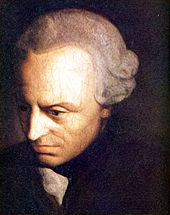 German philosopher Immanuel Kant
German philosopher Immanuel Kant
Germany's influence on philosophy is historically significant and many notable German philosophers have helped shape Western philosophy since the Middle Ages. The rise of the modern natural sciences and the related decline of religion raised a series of questions, which recur throughout German philosophy, concerning the relationships between knowledge and faith, reason and emotion, and scientific, ethical, and artistic ways of seeing the world.
German philosophers have helped shape western philosophy from as early as the Middle Ages (Albertus Magnus). Later, Leibniz (17th century) and most importantly Kant played central roles in the history of philosophy. Kantianism inspired the work of Schopenhauer and Nietzsche as well as German idealism defended by Fichte and Hegel. Marx and Engels developed communist theory in the second half of the 19th century while Heidegger and Gadamer pursued the tradition of German philosophy in the 20th century. A number of German intellectuals were also influential in sociology, most notably Adorno, Habermas, Horkheimer, Luhmann, Simmel, Tönnies, and Weber. The University of Berlin founded in 1810 by linguist and philosopher Wilhelm von Humboldt served as an influential model for a number of modern western universities.
In the 21st century Germany has been an important country for the development of contemporary analytic philosophy in continental Europe, along with France, Austria, Switzerland and the Scandinavian countries.[69]
Science
Main article: Science and technology in GermanyMain article: German inventors and discoverersGermany has been the home of many famous inventors and engineers, such as Johannes Gutenberg, who is credited with the invention of movable type printing in Europe; Hans Geiger, the creator of the Geiger counter; and Konrad Zuse, who built the first electronic computer.[70] German inventors, engineers and industrialists such as Zeppelin, Daimler, Diesel, Otto, Wankel, Von Braun and Benz helped shape modern automotive and air transportation technology including the beginnings of space travel.[71][72]
The work of David Hilbert and Max Planck was crucial to the foundation of modern physics, which Werner Heisenberg and Erwin Schrödinger developed further.[73] They were preceded by such key physicists as Hermann von Helmholtz, Joseph von Fraunhofer, and Gabriel Daniel Fahrenheit, among others. Wilhelm Conrad Röntgen discovered X-rays, an accomplishment that made him the first winner of the Nobel Prize in Physics in 1901.[74] The Walhalla temple for "laudable and distinguished Germans", features a number of scientists, and is located east of Regensburg, in Bavaria.[75][76]
Music
Main article: Music of GermanyIn the field of music, Germany claims some of the most renowned classical composers of the world including Bach, Mozart and Beethoven, who marked the transition between the Classical and Romantic eras in Western classical music. Other composers of the Austro-German tradition who achieved international fame include Brahms, Wagner, Haydn, Schubert, Händel, Schumann, Liszt, Mendelssohn Bartholdy, Johann Strauss II, Bruckner, Mahler, Telemann, Richard Strauss, Schoenberg, Orff, and most recently, Henze, Lachenmann, and Stockhausen.
As of 2006, Germany is the fifth largest music market in the world[77] and has exerted a strong influence on Dance and Rock music, and pioneered trance music. Artists such as Herbert Grönemeyer, Scorpions, Rammstein, Nena, Dieter Bohlen, Tokio Hotel and Modern Talking have enjoyed international fame. German musicians and, particularly, the pioneering bands Tangerine Dream and Kraftwerk have also contributed to the development of electronic music.[78] Germany hosts many large rock music festivals annually. The Rock am Ring festival is the largest music festival in Germany, and among the largest in the world. German artists also make up a large percentage of Industrial music acts, which is called Neue Deutsche Härte. Germany hosts some of the largest Goth scenes and festivals in the entire world, with events like Wave-Gothic-Treffen and M'era Luna Festival easily attracting up to 30,000 people. Amongst Germany's famous artists there are various Dutch entertainers, such as Johannes Heesters, Rudi Carell and Sylvie van der Vaart.[79]
Cinema
Main article: Cinema of GermanyGerman cinema dates back to the very early years of the medium with the work of Max Skladanowsky. It was particularly influential during the years of the Weimar Republic with German expressionists such as Robert Wiene and Friedrich Wilhelm Murnau. The Nazi era produced mostly propaganda films although the work of Leni Riefenstahl still introduced new aesthetics in film. From the 1960s, New German Cinema directors such as Volker Schlöndorff, Werner Herzog, Wim Wenders, Rainer Werner Fassbinder placed West-German cinema back onto the international stage with their often provocative films, while the Deutsche Film-Aktiengesellschaft controlled film production in the GDR. More recently, films such as Das Boot (1981), The Never Ending Story (1984) Run Lola Run (1998), Das Experiment (2001), Good Bye Lenin! (2003), Gegen die Wand (Head-on) (2004) and Der Untergang (Downfall) (2004) have enjoyed international success. In 2007 the Academy Award for Best Foreign Language Film went to F.H. von Donnersmarck's The Lives of Others. The Berlin Film Festival, held yearly since 1951, is one of the world's foremost film and cinemas festivals.[80]
Art
Main article: German artImportant German Renaissance painters include Albrecht Altdorfer, Lucas Cranach the Elder, Matthias Grünewald, Hans Holbein the Younger and the well-known Albrecht Dürer. The most important Baroque artists from Germany are Cosmas Damian Asam. Further artists are the romantic Caspar David Friedrich, the surrealist Max Ernst, the conceptualist Joseph Beuys or the neo-expressionist Georg Baselitz.
Architecture
Main article: German architecture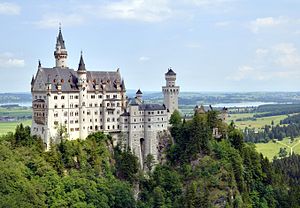 Neuschwanstein Castle in Bavaria.
Neuschwanstein Castle in Bavaria.
Architectural contributions from Germany include the Carolingian and Ottonian styles, important precursors of Romanesque. The region then produced significant works in styles such as the Gothic, Renaissance and Baroque. The nation was particularly important in the early modern movement through the Deutscher Werkbund and the Bauhaus movement identified with Walter Gropius. The Nazis closed these movements and favoured a type of neo-classicism. Since World War II, further important modern and post-modern structures have been built, particularly since the reunification of Berlin.
Religion
Main article: Religion in Germany Portrait of Martin Luther.
Portrait of Martin Luther.
64.1 percent of the German population belongs to Christian denominations. 31.4 percent are Roman Catholic, and 32.7 percent are affiliated with Protestantism [81] (the figures are known accurately because Germany imposes a church tax on those who disclose a religious affiliation / but there are many people, who are religious but not registered[citation needed]). The North and East is predominantly Protestant, the South and West rather Catholic. Nowadays there is a non-religious majority in Hamburg and the East German states.[82] Germany formed a substantial part of the Roman Catholic Holy Roman Empire, but was also the source of Protestant reformers such as Martin Luther. Historically, Germany had a substantial Jewish population. Only a few thousand people of Jewish origin remained in Germany after the Holocaust, but the German Jewish community now has approximately 100,000 members, many from the former Soviet Union. Germany also has a substantial Muslim minority, most of whom are from Turkey.
German theologians include Luther, Melanchthon, Schleiermacher, Feuerbach, and Rudolf Otto. Also Germany brought up many mystics including Meister Eckhart, Rudolf Steiner, Jakob Boehme, and some popes (e.g. Benedict XVI).
Cuisine
Main article: German cuisineThe "home cuisine" differs very much from the "restaurant cuisine". More traditional dishes can be found in restaurants. Cuisine differs also greatly according to regions (in the north people eat fish, in the Rhine region beer is replaced with wine, in Bavaria roasted pork is consumed) and season (in spring people eat white asparagus with ham and sauce hollandaise, in fall people eat green cabbage with a special kind of sausage and mustard and in winter/for Christmas people eat duck or goose with red cabbage, dumplings and brown gravy).
Sport
Main article: Sport in Germany Opened in 2005: the Allianz Arena, one of the world's most modern football stadiums.
Opened in 2005: the Allianz Arena, one of the world's most modern football stadiums.
Sport forms an integral part of German life, as demonstrated by the fact that 27 million Germans are members of a sports club and an additional twelve million pursue such an activity individually.[83] Football is by far the most popular sport, and the German Football Federation (Deutscher Fußballbund) with more than 6.3 million members is the largest athletic organisation in the country.[83] It also attracts the greatest audience, with hundreds of thousands of spectators attending Bundesliga matches and millions more watching on television. The other two most popular sports in Germany are marksmanship and tennis represented by the German Marksmen’s Federation and the German Tennis Federation respectively, both including more than a million members. Other popular sports include handball, volleyball, basketball, and ice hockey.[83] Germany has historically been one of the strongest contenders in the Olympic Games. In the 2008 Summer Olympics, Germany finished fifth overall,[84] whereas in the 2006 Winter Olympics Germany finished first.[85]
Nationalism
Further information: Pan-Germanism and German questionOrigins
Pan-Germanism's origins began in the early 19th century following the Napoleonic Wars. The wars launched a new movement that was born in France itself during the French Revolution. Nationalism during the 19th century threatened the old aristocratic regimes. Many ethnic groups of Central and Eastern Europe had been divided for centuries, ruled over by the old Monarchies of the Romanovs and the Habsburgs. Germans, for the most part, had been a loose and disunited people since the Reformation when the Holy Roman Empire was shattered into a patchwork of states. The new German nationalists, mostly young reformers such as Johann Tillmann of East Prussia, sought to unite all the German-speaking and ethnic-German (Volksdeutsche) people.[86]
Unification
Further information: Unification of GermanyBy the 1860s the Kingdom of Prussia and the Austrian Empire were the two most powerful nations dominated by German-speaking elites. Both sought to expand their influence and territory. The Austrian Empire – like the Holy Roman Empire – was a multi-ethnic state, but German-speaking people there did not have an absolute numerical majority; the creation of the Austro-Hungarian Empire was one result of the growing nationalism of other ethnicities especially the Hungarians. Prussia under Otto von Bismarck would ride on the coat-tails of nationalism to unite all of modern-day Germany. The German Empire ("Second Reich") was created in 1871 following the proclamation of Wilhelm I as head of a union of German-speaking states, while disregarding millions of its non-German subjects who desired self-determination from German rule.
There was also a rejection of Roman Catholicism with the Away from Rome! movement calling for German speakers to identify with Lutheran or Old Catholic churches.[87]
1918–1945
Further information: Weimar Republic and Third ReichFollowing the defeat in World War I, influence of German-speaking elites over Central and Eastern Europe was greatly limited. At the treaty of Versailles Germany was substantially reduced in size. Austria-Hungary was split up. Rump-Austria, which to a certain extent corresponded to the German-speaking areas of Austria-Hungary (a complete split into language groups was impossible due to multi-lingual areas and language-exclaves) adopted the name "German-Austria" (German: Deutschösterreich). The name German-Austria was forbidden by the victorious powers of World War I. Volga Germans living in the Soviet Union were interned in gulags or forcibly relocated during the second world war.[88]
The Heim ins Reich initiative (German: literally Home into the Empire, meaning Back to Reich, see Reich) was a policy pursued by Nazi Germany which attempted to convince people of German descent living outside of Germany (such as Sudetenland) that they should strive to bring these regions "home" into a greater Germany.
After 1945
Further information: Reunification of Germany, German exodus from Eastern Europe, and Flight and expulsion of Germans (1944–1950)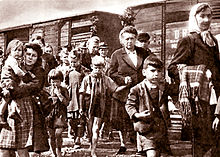 Millions of Ethnic Germans in Eastern Europe were killed or deported after the war.
Millions of Ethnic Germans in Eastern Europe were killed or deported after the war.
World War II brought about the decline of Pan-Germanism, much as World War I had led to the demise of Pan-Slavism. The Germans in Central and Eastern Europe were expelled, parts of Germany itself were devastated, and the country was divided, firstly into Russian, French, American, and British zones and then into West Germany and East Germany. To add to the disaster, Germany suffered even larger territorial losses than it did in the First World War, with huge portions of eastern Germany directly annexed by the Soviet Union and Poland.[89] The scale of the Germans' defeat was unprecedented. Nationalism and Pan-Germanism became almost taboo because they had been used so destructively by the Nazis. Indeed, the word "Volksdeutscher" in reference to ethnic Germans naturalized during WWII later developed into a mild epithet.
However, the reunification of Germany in 1990 revived the old debates. The fear of nationalistic misuse of Pan-Germanism nevertheless remains strong. But the overwhelming majority of Germans today are not chauvinistic in nationalism, but in 2006 and again in 2010, the German National Football Team won third place in the 2006 and 2010 FIFA World Cups, ignited a positive scene of German pride, in fanfare when it comes to sport.[citation needed]
See also
- Germanic peoples
- Ethnic Germans, also referred to as the German diaspora
- German eastward expansion
- Names for the German language
- Pan-Germanism
- German question
- Unification of Germany
- Organised persecution of ethnic Germans
- Flight and expulsion of Germans (1944–1950)
- List of Germans
- List of Alsatians and Lorrainians
- List of Austrians
- List of Swiss people
- List of terms used for Germans
- Ethnic groups in Europe
- Genetic history of Europe
- Anti-German sentiment
- German exodus from Eastern Europe
- List of Germanic peoples
- German American
German people Historical 
Diaspora EuropeTransylvanian Saxons / Landler · Danube / Banat / Satu Mare Swabians · Dobruja · Zipser · Regat · Bessarabia · BukovinaElsewhereCzech Republic (Sudetenland) · Hungary · Bessarabia · Poland · Russia (Volga · Russian Mennonite) · Slovakia · Slovenia (Gottschee County) · Ukraine (Black Sea · Bukovina · Crimea)Balkans and SoutheasternElsewhereArgentina · Bolivia · Brazil · Canada (Hutterites) · Chile · Cuba · Jamaica · Mexico · Paraguay · Peru · United States (Pennsylvania Dutch · Texas · Palatines · Puerto Rico)AfricaNamibia · South Africa (Afrikaners)AsiaOceaniaSee also References
- ^ Germans and foreigners with an immigrant background. 156 is the estimate which counts all people claiming ethnic German ancestry in the U.S., Brazil, Argentina, and elsewhere.
- ^ a b 66.42 million is the number of Germans without immigrant background, 75 million is the number of German citizens Germans and foreigners with an immigrant background
- ^ "Deutsche Welle: 2005 German Census figures". Dw-world.de. http://www.dw-world.de/dw/article/0,2144,2046121,00.html. Retrieved 28 September 2011.
- ^ "CIA World Factbook – Germany: People". Cia.gov. https://www.cia.gov/library/publications/the-world-factbook/geos/gm.html. Retrieved 28 September 2011.
- ^ a b http://hpgl.stanford.edu/publications/EJHG_2002_v10_521-529.pdf
- ^ alongside the slightly earlier term Almayns; John of Trevisa's 1387 translation of Ranulf Higdon's Polychronicon has: Þe empere passede from þe Grees to þe Frenschemen and to þe Germans, þat beeþ Almayns. During the 15th and 16th centuries, Dutch was the adjective used in the sense "pertaining to Germans". Use of German as an adjective dates to ca. 1550. The adjective Dutch narrowed its sense to "of the Netherlands" during the 17th century.
- ^ (Spanish) Hablantes del alemán en el mundo
- ^ e.g. Walther von der Vogelweide. See Lexer, Mittelhochdeutsches Handwörterbuch (1872–1878), s.v. "Diutsche". The Middle High German Song of Roland (ca. 1170) has in diutisker erde (65.6) for "in the German realm, in Germany". The phrase in tütschem land, whence the modern Deutschland, is attested in the late 15th century (e.g. Johann Geiler von Kaysersberg, Ship of Fools, see Grimm, Deutsches Wörterbuch, s.v. "Deutsch").
- ^ OED, s.v. [1] "Dutch, adj., n., and adv."
- ^ Schulze, Hagen (1998). Germany: A New History. Harvard University Press. p. 4. ISBN 0-674-80688-3.
- ^ "German", The Concise Oxford Dictionary of English Etymology. Ed. T. F. Hoad. Oxford: Oxford University Press, 1996. Oxford Reference Online. Oxford University Press. Retrieved 4 March 2008.
- ^ Forsythe, Diana. 1989. German identity and the problem of history. History and ethnicity, p.143
- ^ Forsythe, Diana. 1989. German identity and the problem of history. History and ethnicity, p.146
- ^ http://www.onwar.com/aced/data/sierra/sevenweeks1866.htm
- ^ "US Census Factfinder". http://factfinder.census.gov/servlet/ADPTable?_bm=y&-geo_id=01000US&-ds_name=ACS_2006_EST_G00_&-_lang=en&-_caller=geoselect&-format=.
- ^ Ihre Meinung. "Als Vorarlberg Schweizer Kanton werden wollte – Vorarlberg – Aktuelle Nachrichten – Vorarlberg Online". Vol.at. http://www.vol.at/news/vorarlberg/artikel/als-vorarlberg-schweizer-kanton-werden-wollte/cn/news-20081023-08253040. Retrieved 28 September 2011.
- ^ http://www.deepdyve.com/lp/sage/the-nazi-concept-of-volksdeutsche-and-the-exacerbation-of-anti-AM60h08D5M
- ^ [2]. Development of the Austrian identity
- ^ Peter Utgaard, Remembering and Forgetting Nazism, (New York: Berghahn Books, 2003), 188–189. Frederick C. Engelmann, "The Austro-German Relationship: One Language, One and One-Half Histories, Two States", Unequal Partners, ed. Harald von Riekhoff and Hanspeter Neuhold (San Francisco: Westview Press, 1993), 53–54.
- ^ Redaktion (13 March 2008). "Österreicher fühlen sich heute als Nation – 1938 – derStandard.at " Wissenschaft". Derstandard.at. http://derstandard.at/?url=/?id=3261105. Retrieved 28 September 2011.
- ^ "Fewer Ethnic Germans Immigrating to Ancestral Homeland". Migrationinformation.org. http://www.migrationinformation.org/Feature/display.cfm?ID=201. Retrieved 28 September 2011.
- ^ "External causes of death in a cohort of Aussiedler from the former Soviet Union, 1990–2002". Egms.de. http://www.egms.de/en/meetings/gmds2005/05gmds163.shtml. Retrieved 28 September 2011.
- ^ "World Haplogroups Maps" (PDF). http://www.scs.uiuc.edu/~mcdonald/WorldHaplogroupsMaps.pdf. Retrieved 28 September 2011.
- ^ "Most Widely Spoken Languages". .ignatius.edu. 28 May 2011. http://www2.ignatius.edu/faculty/turner/languages.htm. Retrieved 28 September 2011.
- ^ "Ethnologue: East Middle German". http://www.ethnologue.com/show_family.asp?subid=1205-16. Retrieved 6 March 2011.
- ^ "A Imigração Alemã| Brasil | Deutsche Welle | 14.01.2010". Passeiweb.com. 6 January 1990. http://www.passeiweb.com/na_ponta_lingua/sala_de_aula/geografia/geografia_do_brasil/demografia_imigracoes/brasil_imigracoes_alemanha. Retrieved 28 September 2011.
- ^ "Obsevatorio de Colectividades – Comunidad Alemana". Buenosaires.gob.ar. http://www.buenosaires.gob.ar/areas/secretaria_gral/colectividades/?col=1. Retrieved 28 September 2011.
- ^ German-Argentine Descendants of Germans in Argentina
- ^ a b Oliver Zoellner. "Oliver Zoellner | Generating Samples of Ethnic Minorities in Chile". Research-worldwide.de. http://www.research-worldwide.de/article-chile2005.html. Retrieved 28 September 2011.
- ^ 49.2 million German Americans as of 2005 according to the "US demographic census". http://factfinder.census.gov/servlet/IPTable?_bm=y&-reg=ACS_2005_EST_G00_S0201:535;ACS_2005_EST_G00_S0201PR:535;ACS_2005_EST_G00_S0201T:535;ACS_2005_EST_G00_S0201TPR:535&-qr_name=ACS_2005_EST_G00_S0201&-qr_name=ACS_2005_EST_G00_S0201PR&-qr_name=ACS_2005_EST_G00_S0201T&-qr_name=ACS_2005_EST_G00_S0201TPR&-ds_name=ACS_2005_EST_G00_&-TABLE_NAMEX=&-ci_type=A&-redoLog=false&-charIterations=047&-geo_id=01000US&-format=&-_lang=en. Retrieved 2 August 2007.; see also Languages in the United States#German.
- ^ "A Imigração Alemã no Brasil | Brasil | Deutsche Welle | 25.07.2004". Passeiweb.com. 6 January 1990. http://www.passeiweb.com/na_ponta_lingua/sala_de_aula/geografia/geografia_do_brasil/demografia_imigracoes/brasil_imigracoes_alemanha. Retrieved 28 September 2011.
- ^ 2001 Canadian Census gives 2,742,765 total respondents stating their ethnic origin as partly German, with 705,600 stating "single-ancestry", see List of Canadians by ethnicity.
- ^ "Germans in South Africa". Webcitation.org. http://www.webcitation.org/query?url=http://www.geocities.com/Heartland/meadows/7589/intro_en.html&date=2009-10-25+10:34:36. Retrieved 28 September 2011.
- ^ Professor JA Heese in his book Die Herkoms van die Afrikaner (The Origins of Afrikaners) claims the modern Afrikaners (who total around 3.5 million) have 34.4% German heritage. How 'Pure' was the Average Afrikaner?
- ^ [3]~3,000,000 Including Volga Germans, and other German ancestries
- ^ 597,212 in Russia as of 2002, 0.4 of Russian population
- ^ Vladimir Geroimenko. "France". Ling.gu.se. http://www.ling.gu.se/projekt/sprakfrageladan/english/varldskarta/eng-fra.html. Retrieved 28 September 2011.
- ^ "Alsatians". Everyculture.com. 16 January 2010. http://www.everyculture.com/Europe/Alsatians.html. Retrieved 28 September 2011.
- ^ The Australian Bureau of StatisticsPDF (424 KB) reports 742,212 people of German ancestry in the 2001 Census. German is spoken by ca. 135,000 [4], about 105,000 of them Germany-born, see Demographics of Australia
- ^ http://demo.istat.it/str2006/query.php?lingua=ita&Rip=S0&paese=A11&submit=Tavola
- ^ South Tyrol in figures. Provincial Statistics Institute.
- ^ 378,947 (2010, 2.3% of Dutch population). cbs.nl
- ^ German born only; United Kingdom: Stock of foreign-born population by country of birth, 2001
- ^ 2008, 0.15% of UK population. statistics.gov.uk
- ^ "INE(2006)". INE. http://www.ine.com. Retrieved 28 September 2011.
- ^ 265,944 (2009, 3.3% of Swiss population) Wohnbevölkerung nach detaillierter Staatsangehörigkeit, Swiss Federal Statistical Office. 163 923 resident aliens (nationals or citizens) in 2004 (2.2% of total population), compared to 112 348 as of 2000. 2005 report of the Swiss Federal Office of Statistics. 4.6 million including Alemannic Swiss: CIA World Fact Book, identifies the 65% (4.9 million) Swiss German speakers as "ethnic Germans".
- ^ 2002 census
- ^ (Spanish) / Inmigración Alemana al Perú
- ^ census 2001[dead link]
- ^ 2008, 1.5% of Austrian population. Wer sind die Deutschen in Österreich?
- ^ "Money overcomes ideology as Israelis hunt down German passports| Yediot Ahronot | 31.05.2011". Ynetnews.com. 20 June 1995. http://www.ynetnews.com/articles/0,7340,L-4076384,00.html. Retrieved 28 September 2011.
- ^ "German minority" (in (German)). Auswaertiges-amt.de. http://www.auswaertiges-amt.de/diplo/en/Laender/Rumaenien.html. Retrieved 28 September 2011.
- ^ "There are 6,000 Germans living in Uruguay today and 40,000 descendants of Germans" (in (German)). Auswaertiges-amt.de. http://www.auswaertiges-amt.de/diplo/es/Laenderinformationen/01-Laender/Uruguay.html. Retrieved 28 September 2011.
- ^ "Ethnic German Minorities in the Czech Republic, Poland and Slovakia". Radio.cz. http://www.radio.cz/en/article/27184. Retrieved 28 September 2011.
- ^ Romero, Simon (21 December 2006). "Land reform worries Bolivia's Mennonites". International Herald Tribune. http://www.iht.com/articles/2006/12/21/news/bolivia.php. Retrieved 28 September 2011.
- ^ (Dutch) "Bevolking per nationaliteit, geslacht, leeftijdsgroepen op 1 January 2008". Statistics Belgium. http://statbel.fgov.be/nl/modules/publications/statistiques/bevolking/Bevolking_nat_geslacht_leeftijdsgroepen.jsp. Retrieved 30 May 2010.
- ^ Norway[dead link]
- ^ Joshua Project. "Ethnic groups around the world". joshuaproject.net. http://www.joshuaproject.net/countries.php. Retrieved 28 September 2011.
- ^ "Amid Namibia's White Opulence, Majority Rule Isn't So Scary Now". New York Times. 26 December 1988. http://query.nytimes.com/gst/fullpage.html?res=940DE2D71E3CF935A15751C1A96E948260&sec=&spon=&pagewanted=print. Retrieved 28 September 2011.
- ^ "Dominican Republic" (in (German)). Auswaertiges-amt.de. http://www.auswaertiges-amt.de/diplo/en/Laender/DominikanischeRepublik.html. Retrieved 28 September 2011.
- ^ in the German-Danish border region; see Bund Deutscher Nordschleswiger
- ^ "Greeks Census 2001" (PDF). http://www.statistics.gr/portal/page/portal/ESYE/BUCKET/A1604/Other/A1604_SAP03_TB_DC_00_2001_09_F_GR.pdf. Retrieved 28 September 2011.
- ^ "CSO: Statistics: Persons usually resident and present in the State on Census Night, classifieid by place of birth and age group". Cso.ie. 13 May 2008. http://www.cso.ie/statistics/placebirthagegroup.htm. Retrieved 28 September 2011.
- ^ "Slovakia" (in (German)). Auswaertiges-amt.de. http://www.auswaertiges-amt.de/diplo/en/Laenderinformationen/01-Laender/Slowakei.html. Retrieved 28 September 2011.
- ^ 2000 census
- ^ a b Joshua Project. "joshuaproject.net". joshuaproject.net. http://www.joshuaproject.net/peopctry.php. Retrieved 28 September 2011.
- ^ a b c d Handwörterbuch des politischen Systems der Bundesrepublik (in German). Source lists "German expatriate citizens" only for Namibia and South Africa!
- ^ "Statistics Canada 2006". 2.statcan.ca. 6 January 2010. http://www12.statcan.ca/english/census06/data/topics/RetrieveProductTable.cfm?ALEVEL=3&APATH=3&CATNO=&DETAIL=0&DIM=&DS=99&FL=0&FREE=0&GAL=0&GC=99&GK=NA&GRP=1&IPS=&METH=0&ORDER=1&PID=89189&PTYPE=88971&RL=0&S=1&ShowAll=No&StartRow=1&SUB=705&Temporal=2006&Theme=70&VID=0&VNAMEE=&VNAMEF=&GID=837928. Retrieved 15 March 2010.
- ^ Searle, John. (1987). The Blackwell Companion to Philosophy, "Introduction". Wiley-Blackwell.
- ^ Horst, Zuse. The Life and Work of Konrad Zuse Everyday Practical Electronics (EPE) Online. Retrieved 2 January 2007
- ^ Automobile. Microsoft Encarta Online Encyclopedia 2006. Retrieved 2 January 2007
- ^ The Zeppelin U.S. Centennial of Flight Commission. Retrieved 2 January 2007
- ^ Roberts, J. M. The New Penguin History of the World, Penguin History, 2002. Pg. 1014. ISBN 0141007230
- ^ The Alfred B. Nobel Prize Winners, 1901–2003 History Channel from The World Almanac and Book of Facts 2006. Retrieved 2 January 2007
- ^ (in German) Walhalla Ruhmes- und Ehrenhalle, http://www.walhalla-regensburg.de/deutsch/index.shtml, retrieved 3 October 2007
- ^ Walhalla, official guide booklet. p. 3. Translated by Helen Stellner and David Hiley, Bernhard Bosse Verlag Regensburg, 2002
- ^ Music market worth $US32 billion P2pnet.net 7 Apr. 2004. Retrieved 7 December 2006
- ^ BBC Radio 1 Documentary Retrieved 2006, 10 December
- ^ "Nederlanderse-entertainer-sin-Duitsland" (in Dutch). Die Welt. 17 April 2010. http://www.movienewz.nl/rudicarrell/?sub=extern&waid=36728. Retrieved 7 April 2011.
- ^ 2006 FIAPF accredited Festivals Directory, International Federation of Film Producers Associations, retrieved on 11 December 2006.
- ^ "EKD: Evangelische Kirche in Deutschland – Christen in Deutschland 2005". Ekd.de. http://www.ekd.de/statistik/mitglieder.html. Retrieved 28 September 2011.
- ^ http://www.ekd.de/download/kimi_2004.pdf
- ^ a b c Germany Info: Culture & Life: Sports Germany Embassy in Washington DC. Retrieved 28 December 2006
- ^ Peking 2008 Medal Table International Olympic Committee. Retrieved 11 February 2009
- ^ Turin 2006 Medal Table International Olympic Committee. Retrieved 28 December 2006
- ^ M. A. Chaudhary, Gautam Chaudhary (2009). Global encyclopaedia of political geography. Global Vision Publishing Ho. p. 172. http://books.google.com/books?id=vmyN0bMTth8C&pg=PA172&dq=Johann+Tillmann+Prussia&hl=en&ei=Wj3iTaTXB9G3tweyuamNBw&sa=X&oi=book_result&ct=result&resnum=1&ved=0CCoQ6AEwAA#v=onepage&q=Johann%20Tillmann%20Prussia&f=false.
- ^ Mees, Bernard (2008). The Science of the Swastika. Central European University Press. ISBN 978-9639776180. http://books.google.com/books?id=hLNUx6YK9RIC&lpg=PA21&ots=W_tb-LpaiQ&dq=%22Los%20von%20Rom%22&pg=PA21#v=onepage&q=%22Los%20von%20Rom%22&f=false.
- ^ Fred C. Koch, Jacob Eichhorn (1978). The Volga Germans: In Russia and the Americas, from 1763 to the Present. Penn State Press. p. 151;288. http://books.google.com/books?id=rzJh_whDGmIC&pg=PA151&dq=suppression+Volga+Germans&hl=en&ei=MkDiTYeoM9Ggtgfq6PWjBw&sa=X&oi=book_result&ct=result&resnum=1&ved=0CCoQ6AEwAA#v=onepage&q=suppression%20Volga%20Germans&f=false.
- ^ Teresa Rakowska-Harmstone (1984). Communism in Eastern Europe. Manchester University Press ND. pp. 15–7. http://books.google.com/books?id=QRINAQAAIAAJ&pg=PA15&dq=German+territorial+losses+to+soviet+union&hl=en&ei=NUPiTbjVIIWftwfUrYCGBw&sa=X&oi=book_result&ct=result&resnum=1&ved=0CCoQ6AEwAA#v=onepage&q=German%20territorial%20losses%20to%20soviet%20union&f=false.
External links
Categories:- Ethnic groups in Europe
- German people
- Germanic peoples
- Ethnic groups in Germany
- West Germanic peoples
- High German
Wikimedia Foundation. 2010.

